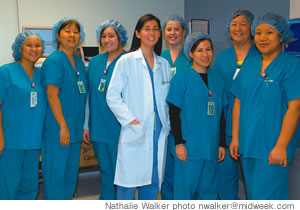
Colon Cancer Awareness
March 09, 2011
By Dr. Mari Ikeguchi


Dr. Mari Ikeguchi
Chief of gastroenterology at Straub Clinic & Hospital
Where did you receive your schooling/training?
I attended medical school at Columbia. Then I did my internship, residency and fellowship there, and stayed on as faculty.
How long have you been practicing?
I’ve been a doctor since ‘99.
{embed=“elements/box_ad”}
How tenacious or treatable is colon cancer?
It’s extremely treatable. It has a greater than 90 percent cure rate if you catch it early. However, only 39 percent of colorectal cancers are found at an early stage, hence the big push for screening.
Can you talk about screening demographics?
An article just came out that talked about how regionally, where you live, plays a big factor in screening rates. In the United States, minorities are much less likely to be screened overall. But this article demonstrated that Asians in Hawaii have one of the highest screening rates in the country. More than half of Asians have been screened in Hawaii. For Caucasians, only 38 percent were screened. So there is more work to be done.

|
What is the high Asian rate attributed to?
The study authors pointed out that gastrointestinal cancers are common among
Japanese people, and that this may boost awareness of the importance of screening in Hawaii, where Japanese culture is influential. As for minorities elsewhere in the U.S., it is suspected that some of the differences in screening have to do with how well doctors can penetrate into the community in terms of providing access to care, insurance coverage, awareness and overcoming language barriers.
What symptoms might suggest a person has colon cancer?
You can look like the picture of health and have absolutely no symptoms, which is why screening is so crucial. When we interview patients we ask questions like have you had any bleeding from the rectum, changes in your bowel habits such as new diarrhea, constipation, have the caliber of your stools changed? Other things we want to know about are do you have any abdominal pain, fatigue, undesired weight loss or anemia?
{embed=“elements/google_ad336x280”}
What happens when you catch it early?
Most colon cancers arise from polyps, which are abnormal growths in the colon. Not all polyps are cancer, but some can develop into cancer. If you find a colon polyp early, while it is a precancerous growth, you can remove it. If colon cancer has developed, treatments include surgery to remove the cancerous part of the colon and/or chemotherapy, radiation.
Although colon cancer can occur at any age, it is more likely to occur as people get older. So we start screening at 50 unless you have other high-risk factors. Also, the American College of Gastroenterology recommends that African-Americans begin screening at age 45.
What causes colon cancer? Is it diet-related?
Age is the biggest risk factor, but there is no single factor. Genetics, lifestyle and diet all play a role. We tell people to try to eat healthy, avoid red meat, eat your fruits and vegetables, stay at a healthy weight and exercise. Avoid a diet that is high in fat, alcohol and, of course, smoking.
How do you test for colon cancer?
There are a variety of ways - colonoscopy, sigmoidoscopy (which looks at about a third of the colon), X-ray studies, FOBT (fecal occult blood test - a simple test to detect hidden “occult” blood in the stool that can be a sign of a colon cancer), and more recently a virtual colonoscopy. A traditional colonoscopy is considered the current gold standard and the best test to diagnose and treat if you have polyps. To prepare for a colonoscopy you need to drink a laxative to empty your colon the day before. During the colonoscopy you will be given a light sedative and then the doctor uses a flexible fiber optic tube that has a camera and a light attached to it to look at your whole colon. The doctor will look for polyps or other abnormalities. If there are polyps found, they are removed. The exam lasts about 30 minutes.
Are there any advancements in the field for screening or treating?
There has been a lot of interest in virtual colonoscopy, which is less invasive and does not require sedation. Virtual colonoscopy is performed with a CT scanner (a 3-dimensional X-ray) which produces images of the colon. This test is less invasive, though it is not believed to be as reliable at finding small polyps. Another limitation is that it does not allow for removal of the polyp, so you would still need to have a colonoscopy. President Obama had this test done. It is great that he underwent screening, though his decision to go through with a virtual colonoscopy was met with some criticism by gastrointestinal experts, who said it was sending a mixed message to the public about what the optimal method of screening should be. We’re still telling people that the best test is a colonoscopy.
A new advancement has been the development of the fecal immunochemical test (FIT). This is a stool test that uses antibodies to detect the presence of blood in the stool, and it is very good at detecting early cancers or advanced polyps. Another option is the stool DNA test. This test can detect certain DNA changes in the stool, which arise from the cells of precancerous polyps or cancerous tumors.
Any final words about colon cancer?
It’s the second leading cause of cancer death (after lung cancer), and when detected early is easy to treat and often curable. Some people shy away from screening because it’s “that kind” of exam. But to quote Katie Couric, “don’t die from embarrassment,” just get it done.